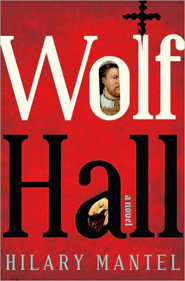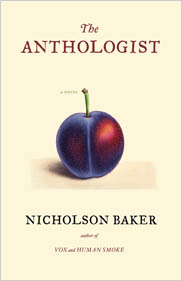-
March 24, 2010
Quarterfinals
-
Commentary by
Kevin Guilfoile & John Warner
-
Today’s Winner:
1Wolf Hall
John: I have a question for you, my friend, and perhaps for everyone following along as part of our Tournament. How do you choose what you read? I ask because it was brought to mind by this statement of Meave Gallagher’s in her judgment: “I am a huge sucker for historical fiction set in 16th-century western Europe.”
I’m pretty confident that this is a sentence that never has, and never will escape my lips. I am a sucker for many things—reality television starring a Kardashian, a good dead-relative excuse from a student, and just about anything that contains even a morsel of chocolate—but when someone says, “historical fiction,” my gut almost always says, “no, not for you.” I will almost never choose to read a book in this particular category, and even before Wolf Hall made the final list I was lamenting its probable inclusion as one of the books I’d read far more out of duty than interest. And in this case, my gut was kind of right. I thought the book was kind of boring, filled with all those people that have been dead for so long.
Don’t get me wrong, I’m not entirely against narrative history, at least as long as it comes packaged by Steven Spielberg and Tom Hanks and airs on HBO.
I think it’s an important and interesting question because of how limited we are in the number of books we can read in a lifetime. I consider myself a pretty avid reader, and I finished 47 books last year, not even one a week. Let’s imagine a nice 60-year span of productive reading in my adulthood, where I average 40 books a year. That’s only 2,400 books in a lifetime. None of us can even come close to reading all the great books ever published, so every time I end up spending time with a book where that time was not well spent, I’m agitated, so I want to make sure that each choice maximizes the potential for a positive experience.
When left to my own devices I almost always choose fiction written about contemporary life. These are the stories I’m drawn to as a reader. They’re also the stories I’m drawn to as a writer. I often feel like writing is one of my personal tools by which I make sense of the world, and the next best experience for me is to read a book by someone else that’s steeped in the same concerns. The end result, however, can sometimes make for a pretty myopic reading list. It’s like finding a thing you really like at a restaurant and ordering it every time because you’re sure you’re going to like it, but at the same time, you could be missing out on something even better.
Once I fall hard for an author, they have me for life, further shrinking the field. Richard Russo in the tourney is someone whose books I’ll always read.
The last two books I finished were Sam Lipsyte’s The Ask and Next by James Hynes. I read those because I loved their previous books. Their current ones delivered much the same pleasures as their last efforts. They were every bit as good as I hoped and expected, but I’d already tasted those flavors. Should I be forcing myself to be a bit more adventurous, to turn toward the unexplored territory, to occasionally pick pistachio over mint chocolate chip at Baskin-Robbins?
Meave was far more impressed with The Anthologist than she figured. One of my favorite reads of the tourney, and of the entire year, is historical fiction: tomorrow’s Cinderella story no. 4 seed, The Book of Night Women. Without the tourney, I never would have heard of the book, let alone read it. Sometimes I think we (meaning me) might be better off leaving the choice of what to read with someone or something else.
Which is why I’m thinking of starting a new free service for readers. I will choose your next book for you. In the comments, all you have to do is list the last five books you’ve read and I will tell you what to read next.
Kevin: That’s a great question, and it’s related to the discussion we had on Monday about the “If you liked this, then you should read that” school of marketing. Like most people, I think, I choose books based on recommendations from friends, primarily. From you frequently. Clearly I’m influenced at some level by the media. The thing that makes it unpredictable, though, is what I’m really looking for is not a particular kind of story or setting. I’m really trying to replicate a certain experience. Books I love make me feel a certain way when I’m reading them. They are difficult to leave and exciting to come back to. It’s hard to describe and almost impossible to deconstruct. It’s chemistry. It’s alchemy. It’s humbug and superstition. That’s why when I’m at home I always read in the same chair. I’m convinced it must hold part of the power.
Guessing which books will do that to me is part of the fun, but I’m not very good at it. As you say, I often would be better off letting someone else choose for me.
I’m reading a (very popular) book right now, a debut novel that has sold bajillions of copies and received great reviews. Technically it’s pretty much a disaster. I’m not convinced the author ever read a novel with a thought toward how one is constructed. The first hundred pages or so are nothing but a series of forced meetings between different pairs of individuals, one of whom has a really long and confusing piece of exposition to tell the other. The prose is stiff, the dialogue is often improbable or unnecessary. And yet I’m liking it, because the characters are appealing. Because the author has some instinctive storytelling ability that overcomes his/her ignorance of craft. I don’t know why. I can poison that enjoyment because I know the book isn’t perfect or I can sit back in my good chair and I can go with it. Will I call you up tomorrow and swear that you’ll enjoy this book the way I do? Probably not. Certain books just work voodoo, man. But even a good book’s voodoo doesn’t work the same on everybody.
John: Voodoo is right. I hear people (including me) all the time say about books things like, “the writing is terrible, but I’m really enjoying it.” Or the opposite, like in the case of Lorrie Moore, where I could agree with all the slings and arrows thrown the book’s way, but for whatever reason, I’ve thrown an invincibility shield over the thing.
We experienced it in last year’s Tournament, where you and I were underwhelmed in the extreme about 2666, while some of our commenters held it in the highest esteem. It’s like each book sends out some kind of specific frequency signal that only some readers are going to be able to tune toward. It’s why The Help, a book that to you and me looks like a no-brainer book-club juggernaut, could get passed on by 45 agents. It’s why A Confederacy of Dunces moldered in a closet until it found its way into the hands of Walker Percy. It’s why just about every book that ever found success first had to run through a gauntlet of failure. I’ve always thought that this would be a potential advantage to debut books in our Tournament, that they’ve been more heavily vetted (for lack of a better word) and therefore might have broader or stronger appeal, but as our statistician Andrew Seal points out, first-time authors historically do quite poorly in the quest for the Rooster. This year isn’t looking much different.
Kevin: We both have Wolf Hall high in our confidence rankings, but I placed it one spot above you. My lead is now 11 points, 138-127.
The Anthologist was not among the top four vote-getters in the readers poll, so our candidates for the Zombie Round remain the same, listed alphabetically:
- Everything Ravaged, Everything Burned
- Fever Chart
- A Gate at the Stairs
- Miles From Nowhere
And one of your favorites goes into battle tomorrow as The Book of Night Women takes on Big Machine.
Kevin Guilfoile is a contributing writer for TMN. His debut novel, Cast of Shadows, has been translated into more than 17 languages, and his second novel, The Thousand, will be published in August 2010 by Alfred A. Knopf.
John Warner is a contributing writer for TMN. He is the author of Fondling Your Muse: Infallible Advice From a Published Author to the Writerly Aspirant. He teaches at Clemson University.

















